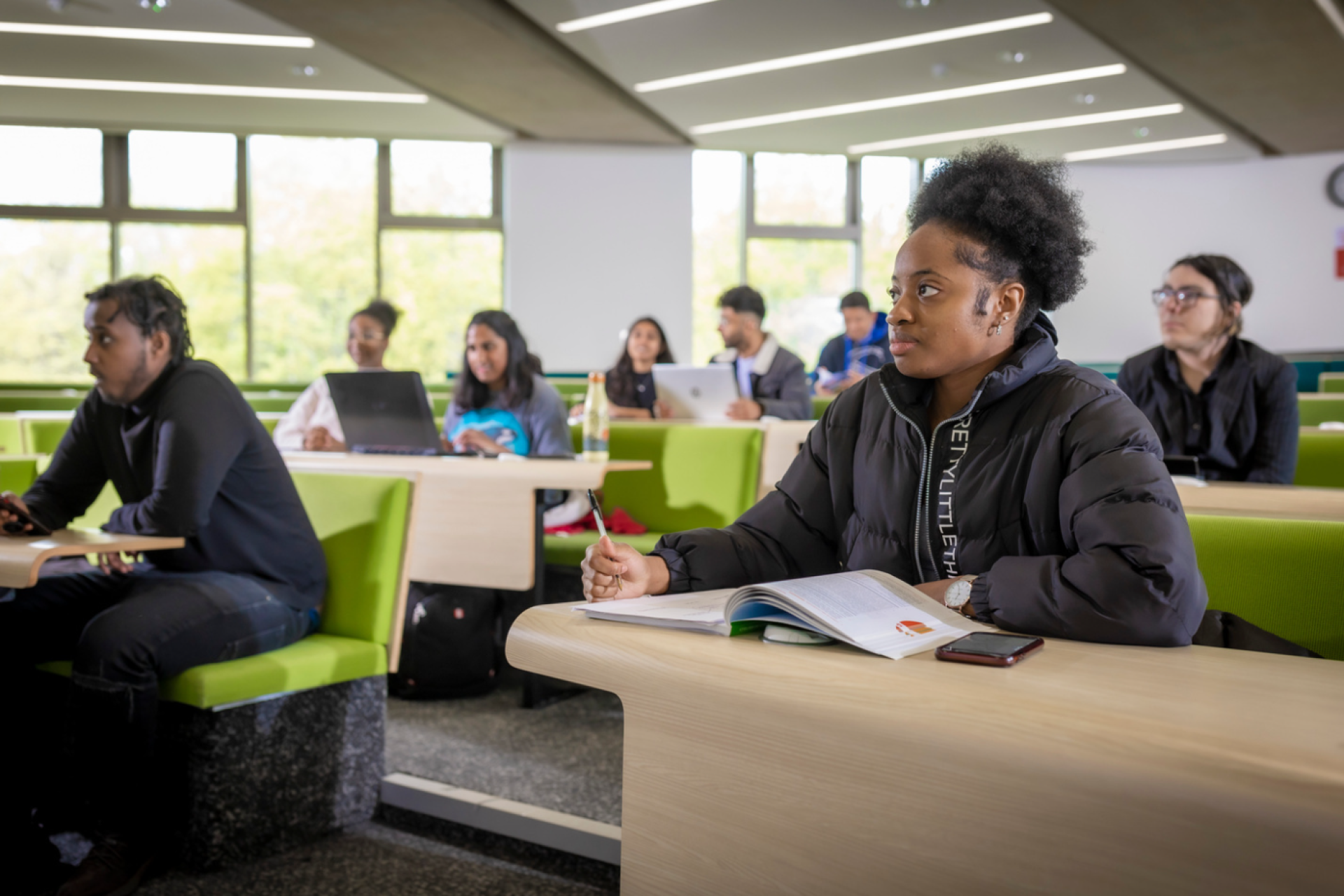Engaging with your studies

We want all of our students to succeed, and the Attendance and Engagement Policy and Procedure is designed to ensure that you have support to engage fully, get the most from your time at Kent, and succeed in your studies.
Below are the steps in the procedure, and also information about support if you are struggling to engage.
The Attendance and Engagement Procedure
The Attendance and Engagement Procedure as outlined below applies to all undergraduate and postgraduate taught students (not including apprenticeships and distance learning programmes).
To ensure that you have support at appropriate points if you need it, we check your in-person attendance across each teaching term. If we see a pattern of low-attendance, we will contact you to discuss support and help you get back on track.
Unfortunately, if you are not attending teaching for an extended period of time, University statutory and regulatory requirements mean that we cannot allow you to continue on your course. Students who have 6 weeks in a row of low attendance (10% or below) will normally be withdrawn from study.
Please read the information below to ensure that you understand the steps in the Attendance and Engagement Procedure and what is expected of you as a student in terms of attendance and engagement with study.
What we mean by "attendance and engagement"
Attendance:
Attendance is one form of engagement, defined as participation in timetabled teaching activities.
Engagement:
Participation in activities that are related to academic study. While not an exhaustive list, engagement includes:
- Attending live, timetabled teaching activities (e.g. lectures).
- Completing and submitting in-course assessments (e.g. coursework).
- Completing final examinations (both online and in-person).
- Regularly engaging with module content on Moodle (e.g. watching module recordings, and reviewing module slides).
- Attending scheduled meetings with Academic Advisers and/or Supervisors.
Low attendance:
For the purpose of the Attendance and Engagement escalation procedure, the low attendance threshold is defined as 10% or less attendance between checkpoints at in-person timetabled teaching activities.
Timetabled teaching activities:
Timetabled, live events related to academic study including (but not limited to) lectures, seminars, workshops, labs and practical activities, final examinations, and in-course assessments (when timetabled and requiring that students attend all together.)
Note on Attendance vs Engagement:
The Attendance escalation procedure is based on in-person attendance at timetabled teaching activities. However, as outlined in the Attendance and Engagement Policy, students are expected to fully engage with their studies.
While escalation in this procedure is based only on in-person attendance, all engagement will be included as part of discussions with students at each step in the escalation process.
We are here to help
There are lots of people and services available to provide advice and help if you are struggling to attend and engage with your studies.
Engagement Support
Contact Engagement Support you have personal circumstances that need support or if you think you might need to take a break from your studies.
Your Academic Adviser
Your Academic Adviser is the best person to speak to if you need help to get back on track with your studies, or if you are considering a change to your course.
Presto Attendance
If you have a question about how to register your attendance, how to self-report absence, or if you are having trouble using Presto, then check the Presto webpage guidance or email the Attendance team.
Skills for Academic Success
For help to develop your study skills, for revision help, assessment advice, and more. See the online resources and book appointments as needed.
Your next steps if your are escalated for low attendance
If you are contacted about your attendance and engagement, then this is a prompt to take action.
1. Start attending.
Attendance is a required form of engagement, and you will not be allowed to continue on your course if you are not attending timetabled teaching activities.
2. Log your attendance
Register your attendance on Presto at each teaching activity, and if you have trouble then speak to a staff member during the session to ask that they update Presto for you.
3. Self-Report absences.
If you need to miss any teaching activity because of unavoidable personal circumstances or situations, then self-report your absence on Presto so that we can support.
4. Speak to someone.
We want to help if you are struggling or have personal circumstances that stop you from attending. Contact Engagement Support or speak to your Academic Adviser.
Speak to your Academic Adviser to support your progress
Your Academic Adviser
Your Academic Adviser is a personal contact for you, available when you need guidance about your module choices, your course, your academic progress and development.
If you are struggling with course content, considering a course change, or if you have fallen behind and need help planning how to get back on track, then speak to your Academic Adviser.
If you have personal circumstances impacting your engagement, or if you would prefer to speak to a non-academic member of staff, then contact the Engagement Support team.

If you are not able to engage with your studies now ...
You may need to take a break from study
If you have circumstances that mean you are not able to attend and engage in your studies, then you may need to consider intermitting. Intermitting means taking a break from your studies now, to return to restart the stage in the next academic year.
Intermitting will impact your student finance and visa (if applicable). Please contact the Kent Students Unions advice service (Canterbury) or The Hub advice service (Medway) to discuss what this will mean for you.

If you are falling behind in your course work ...
You may wish to request an extension on work
If you have personal circumstances that mean that you are not able to do your best on an assignment or that you may miss a deadline, then you may wish to request an extension or End of Year Mitigation on your work.
If you have already self-reported an absence on Presto, you will still need to separately request mitigation for your extenuating circumstances on Kent Vision. For guidance on what counts as eligible and how to request an extension or End of Year Mitigation, please see the Extenuating Circumstances webpage.

Frequently Asked Questions
The University recognises that students may occasionally have to miss some teaching activities due to unavoidable and unforeseen circumstances. If this happens, please self-report your absence in advance where possible, or on the first day you are unable to attend.
Self-Report your absence in Presto (please see the instructions on how to log an absence).
If your circumstances mean that you will also miss a submission deadline, then you will need to separately submit an Extenuating Circumstances request via Kent Vision.
Please note that even if you self-report absence, the Attendance and Engagement escalation process will still apply, you will still be escalated in line with the Attendance and Engagement escalation procedure.
However, students are encouraged to self-report absence because this counts as a form of engagement, and notifying the University of necessary absence will help the Engagement Support team to provide appropriate support.
The Attendance and Engagement escalation procedure is based on recorded attendance at in-person teaching activities, and for this reason it is essential that you register your attendance at each teaching activity.
Students are required to register their attendance at the start of each teaching activity. Registration after the first 20 minutes of teaching will be recorded as late attendance.
If you are unable to register attendance at a teaching activity, speak to a staff member during the session to ask that they update the attendance record on your behalf. It will be difficult for staff to confirm whether students did attend if approached after a teaching activity has ended, and so it is important to speak to staff right away when the issue arises.
Yes, it's a big deal! Please do not share the attendance registration codes with other students.
Students are expected to behave honestly and in a professional manner and only register their own attendance. Attempting to register attendance for another student and/or sharing attendance registration codes with students not in attendance is considered a breach of Student Code of Conduct and therefore the Student Discipline Procedure would apply. In the case of professionally regulated courses, such behaviour could also lead to a Fitness to Practice investigation.
At Step 1 of the Attendance and Engagement procedure, you will be invited to drop-in and meet with someone from the Engagement Support team.
At Step 2 you will need to book a meeting with your Academic Adviser.
Please do not be nervous at these meetings - these meetings are intended to be supportive, and the purpose of the meetings will be to:
- Discuss any personal circumstances stopping you from engaging with your studies.
- Discuss the support options available.
- Discuss other options (eg. intermission) if appropriate.
- Agree on an action plan to help you get back on track and engage fully with your studies moving forward.
Yes, unless you are on a Distance Learning course with different requirements, you still have to attend all timetabled teaching activities even if you are doing all of your work and engaging with your modules on Moodle.
Attendance is a form of engagement, and students are expected to fully engage with their studies and attend all teaching activities.
All engagement will be considered as part of discussions with students at each step in the escalation process, but the escalation steps noted above are based on in-person attendance at timetabled, synchronous teaching activities.
We are here to support you if you have personal circumstances that mean that you need to miss some teaching, but if you are not able to attend teaching for an extended period of time, you may need to consider intermission, to return to study in the next academic year when you are in a better position to fully engage.
To find contact information for your Academic Adviser: